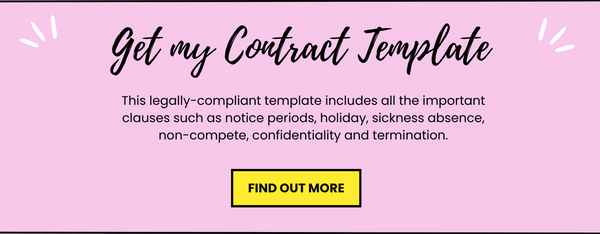Do my staff really need employment contracts? Or is it just a waste of money?

In a nutshell, the answer’s yes, you do need employment contracts for all your staff – it’s what responsible employers do. 😀
Size of business is irrelevant. But if you’re a small business, you could argue it’s even more important to protect yourself and invest in good employment contracts.
And what’s more, your employment contracts need to comply with UK law – and should be put together accurately and comprehensively – so that you and your employees know exactly what you’re both agreeing to. 💌
After all, there are some very basic templates out there, that may not offer you the clarity, options, and protection you need. That’s why I created the ultimate employment contract template that covers everything from confidentiality, non-compete, IP, overtime, GDPR and much more!
Don’t worry if you don’t have them in place today, it’s never too late to introduce employment contracts to your business. Or indeed, improve upon what you already have. 📈
But, if you’re hiring for the very first time – start off the right way and invest in a great quality employment contract from the outset.
Why you might not bother 🔎💰⏱
In my experience, there’s a plethora of reasons small businesses will avoid getting employment contracts in place. Most commonly:
- Lack of time
- Lack of know-how
- Lack of budget
- Low numbers of staff
- Employees are family members or friends
- A belief that they get greater flexibility from their staff without them
- A view that a ‘written statement of employment particulars’ is enough.
Whilst this is understandable – it’s a false economy – potentially leaving you vulnerable as an employer.
Of course, there are also different types of contracts to consider which be confusing, including: full-time, part-time, fixed-term, and zero-hour contracts. Here's a link to the DIY Contract Templates I offer in case you need one.
And when you make a job offer, you’ll need the relevant employee new joiner forms and a employee handbook which is a critical addition to a contract. This outlines what your policies are, for example, your smoking and vaping policy, or your policy around sickness absence.
Isn’t a verbal agreement enough?
Legally, a contract can start as soon the offer of employment is accepted – even when that’s verbally. However, as an employer, you are required to provide your employees and workers with a ‘written statement of employment particulars’. This isn’t an employment contract, but it does state the main conditions of employment.
Without a robust, well-written employment contract, you might not be fully protected if things start to go wrong. And that’s no way to run a business if you have suppliers and customers who depend on you and your team. ❎
After all, even the strongest relationships can be tested in the workplace. You may feel you have a fantastic relationship with somebody – right up until you begin to work with them – and money’s involved.
What could possibly go wrong?
In the absence of a robust employment contract, you might be more at risk of:
❌ Unnecessary disputes that take time to resolve and can cause bad feeling in the workplace.
❌ Employees taking important knowledge about you and your business elsewhere.
❌ Being taken to an employment tribunal.
In my experience, employment contracts could be enhanced significantly with the incorporation of key clauses that are often missed out. For example, the addition of restrictive covenants – sometimes called post-termination restrictions. They specify things like: preventing your employees from working for a competitor and taking all your company secrets to them.
HERE’S THE LEGAL BIT
A well-written employment contract could help to protect you and your business from being fined, or even sued. Whilst that’s an unusual thing to happen, it’s not impossible – as shown by the below facts and stats…
- In 2018/19, the average award given by employment tribunals for unfair dismissal was £13,704.
- One organisation had to award an employee £16,000 for discrimination against an employee with cancer.







